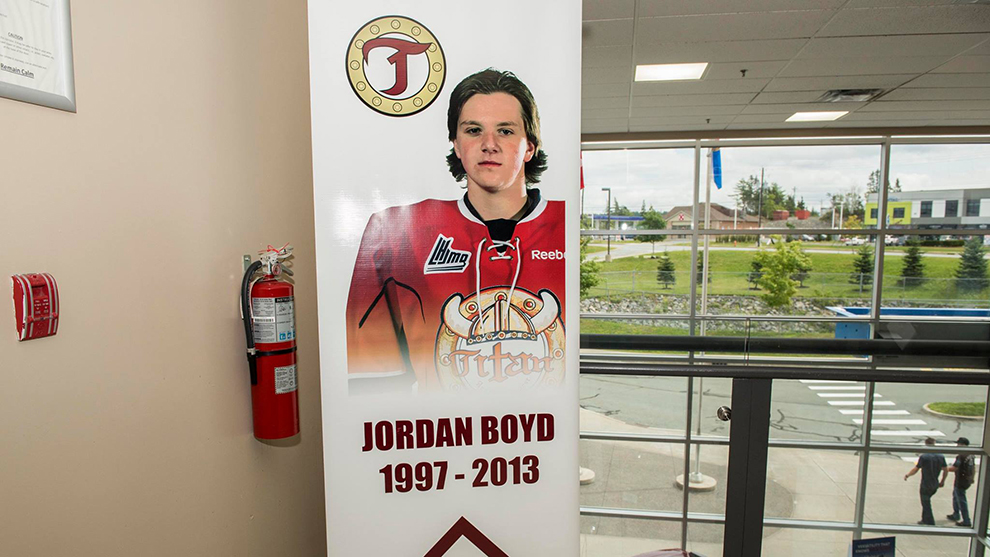QMJHL
QMJHL updates safety protocol, donates $50K to Jordan Boyd Foundation
Boyd died on the ice in 2013 due to undiagnosed heart condition

caption
Jordan Boyd died on the ice at training camp in 2013.
caption
Jordan Boyd died on the ice at a training camp in 2013.The Quebec Junior Men’s Hockey League’s commissioner announced new safety protocols for the league Tuesday in response to the 2013 death of a 16-year-old player.
Jordan Boyd died from cardiac arrest during the QJMHL training camp in Bathurst, N.B., in August 2013. His family was at the news conference in Halifax for the announcement.
“We understand that there is no foolproof system that can ensure tragedies like what happened to Jordan from happening again,” said Stephen Boyd, Jordan’s father, at the news conference. “But we do think something can be learned from this, to improve the chances of a different outcome in the future.”
Boyd passed health exams before the camp, but the QMJHL did not specifically require cardiac health exams. At the time, the league required an automated external defibrillator, or AED, to be at the rink, but it wasn’t used on Boyd after he collapsed.
“I’m not here to say that what happened in Bathurst was right or was not right, or something went wrong, or something like that,” said QMJHL commissioner Gilles Courteau. “I’m here today to announce, following the passing of Jordan, all the changes we’ve made to improve our players’ environment situation.”
New protocols
The new protocols were implemented at the start of the 2017-18 season, but only announced on Tuesday.
Each team must have at least three staff members trained in CPR and life-saving techniques, like how to use an AED. Before, it was only one. Teams must have at least two of these members at all team events, including games, practices and tryouts.
Courteau said that teams would pay for extra staff, but current staff can also do the training. Every year, teams have to report which staff members have been certificated and need to take refresher training.
Each team must also have working AEDs at team events. Although, Courteau did not specify whether the teams have to own the AEDs or if they could use ones provided by the arena.
Annual audits of these protocols will take place to ensure compliance.
“We know that this is a good thing for the league,” Boyd said. “Not just for right now but for all future QJMHL players as well.”
The Halifax Mooseheads are already complying with the new protocols, Scott MacIntosh, a team spokesman, said Tuesday. In an email to The Signal, MacIntosh said the team has three staff members trained for AED use.
Robin Hunter, the Mooseheads’ athletic therapist, has one with her “at all times,” MacIntosh said, “which includes on the bench, on the bus and in the room.”
Stephen Boyd said it would be “a good start” to improve physical examinations of players by implementing electrocardiograms.
In addition to announcing new safety protocols, the QMJHL donated $50,000 to the Jordan Boyd Foundation. The foundation is set up to educate and raise awareness of inherited heart diseases in young people — athletes in particular.
It also administers the Jordan Boyd Leadership Award Scholarship, which goes to an amateur hockey player who has demonstrated a passion for sportsmanship, learning, leadership and community.
With files from Jessica Sundblad

